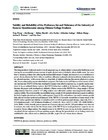| dc.contributor.author | Wang, Ting | |
| dc.contributor.author | Kuang, Jin | |
| dc.contributor.author | Herold, Fabian | |
| dc.contributor.author | Taylor, Alyx | |
| dc.contributor.author | Ludyga, Sebastian | |
| dc.contributor.author | Zhang, Zhihao | |
| dc.contributor.author | Kramer, Arthur F. | |
| dc.contributor.author | Zou, Liye | |
| dc.date.accessioned | 2023-08-18T13:40:57Z | |
| dc.date.available | 2023-08-18T13:40:57Z | |
| dc.date.issued | 2022-11-29 | |
| dc.identifier.citation | Wang, T., Kuang, J., Herold, F., Taylor, A., Ludyga, S., Zhang, Z., Kramer, A. F., & Zou, L. (2022). Validity and reliability of the preference for and tolerance of the intensity of exercise questionnaire among Chinese college students. International Journal of Mental Health Promotion, 25(1), 1-12. https://doi.org/10.32604/ijmhp.2022.022504 | en |
| dc.identifier.issn | 1462-3730 | |
| dc.identifier.uri | https://aecc.archive.knowledgearc.net/handle/123456789/198 | |
| dc.description | Available under License - Creative Commons Attribution: https://creativecommons.org/licenses/by/4.0/ | en |
| dc.description.abstract | The rising prevalence of physical inactivity is in all age groups (e.g., in college students) a major public health issue as not meeting the recommended minimum amount of regular physical activity is linked to adverse health events. Vice versa, there is mounting evidence that achieving the recommended amount of regular physical activity is a vital element to prevent chronic diseases, but there is often an insufficient adherence to planned and structured forms of physical activity (i.e., physical exercises). In this context, there is a large body of evidence indicating that exercise adherence is, among other factors, influenced by exercise-related affective responses. The Preference for and Tolerance of the Intensity of Exercise Questionnaire (PRETIE-Q) has been developed to measure these affective responses (e.g., to specific exercise intensities). So far, no validated Chinese version of the PRETIE-Q has been available in the literature. To address this gap in literature, the present study developed and validated a Chinese version of the PRETIE-Q in a large sample of Chinese college students. Data from a total of 1117 college students were collected for analyses concerning factorial validity and construct validity. The re-test reliability was established using a sample of 150 randomly selected participants. In addition, the level of regular physical activity (PA), cardiorespiratory fitness (CRF), and resilience were used to examine possible links with two domains (preference and tolerance) of the PRETIE-Q. Our results showed that a Chinese version of the PRETIE-Q has a good fit and reliability (Cronbach’s α of 0.72 to 0.85 for preference and tolerance, respectively; ICC: r = 0.72 of preference and r = 0.67 of tolerance; fit indices: χ2 = 21.612, df = 19, p > 0.05, TLI = 0.997, CFI = 0.998, RMSEA = 0.016, SRMR = 0.024). Secondly, positive associations of intensity-tolerance with PA, CRF, and resilience were observed. In summary, this study indicates that the Chinese version of the PRETIE-Q has sound psychometric properties and can be used in Chinese college students. The adapted version of the PRETIE-Q paves the way for further research on exercise-related affective responses in Chinese-speaking samples, although the generalizability of our findings needs to be established for other cohorts such as adolescents and older people with and without chronic diseases. | en |
| dc.language.iso | en | en |
| dc.publisher | International Journal of Mental Health Promotion | en |
| dc.subject | PRETIE-Q | en |
| dc.subject | Pleasure | en |
| dc.subject | Intensity | en |
| dc.subject | Tolerance | en |
| dc.subject | Preference | en |
| dc.subject | Validity | en |
| dc.title | Validity and reliability of the preference for and tolerance of the intensity of exercise questionnaire among Chinese college students | en |
| dc.type | Article | en |
| dc.identifier.doi | https://doi.org/10.32604/ijmhp.2022.022504 | |
